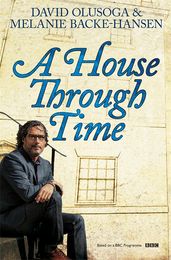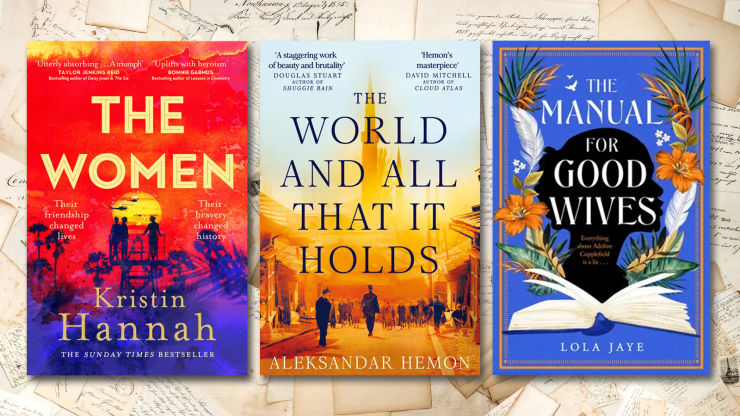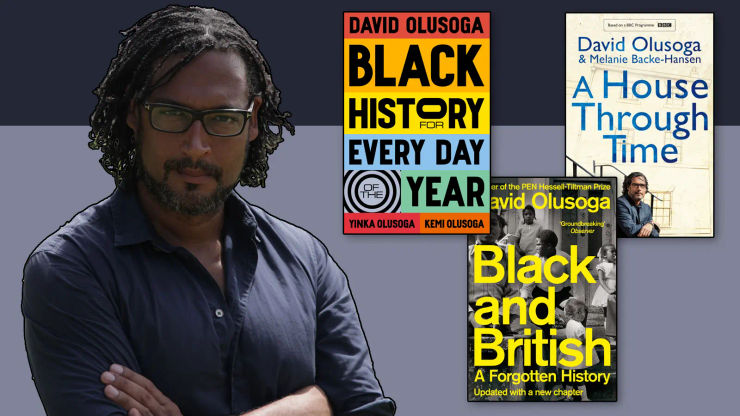David Olusoga and Melanie Backe-Hansen on A House Through Time
We spoke to historian and A House Through Time presenter David Olusoga and series research consultant Melanie Backe-Hansen about why the history of houses is so compelling, and where to begin your own research into the history of your house.

Audiences have been fascinated by A House Through Time, the BBC programme in which historian David Olusoga explores the history of a single residential dwelling though each series, and many have been inspired to trace the history of their own home. To accompany the series, David and series research consultant Melanie Backe-Hansen have written A House Through Time, a vividly readable history of the British city packed with remarkable human stories. The book is also full of tools which readers can use to begin their own investigations. We spoke to David and Melanie about the programme, why David is drawn to the history of everyday houses and how to start researching your house’s story.
David Olusoga
The television series A House Through Time has captivated audiences. Is there a particular person or family in any of the houses you have explored whose story resonated with you, or moved you more than others? If so, who and why?
Given how we are all having to live our lives in 2020 I find myself drawn back to the story of John and Elizabeth Bowes, a couple who lived at 62 Falkner Street in Liverpool, the house at the centre of the first series of A House Through Time. They moved in around 1853. John was a wine merchant and brewers agent. When cholera arrived in Britain in 1854 they may well have presumed they would be relatively safe, being well-off and living in a grand house that was located away from the city's unhealthy and polluted slums. But John contracted the disease, probably while selling beer to the dock-side pubs, and became one of the twenty thousand people who died in Britain during the cholera epidemic of 1854. The story of the Bowes is a reminder of a fundamental reality; that throughout history every generation has had to face what we are currently facing, life under the shadow of contagious disease.
What first inspired you to discover the histories of everyday houses?
I did a degree in Urban History which taught me how to read cities and try to understand the forces that shaped them. Part of that involved learning how to decipher the clues within the architecture and design of houses, and work out when and why they were built. So houses and the history of the industrial city are areas of history I have long been passionate about.
What is it about the study of history that excites you most?
I'm interested in the history of people and communities who lived on the margins of their societies and whose voices are difficult to find. While making three series of A House Through Time for the BBC, and while writing the book to accompany them, I have been able to reconnect with my passion for the history of the Victorian slums. This is one of British history’s great epics. An intergenerational struggle to improve the conditions of the poor. It is a history with its own heroes, such as the great sanitary reformer Edwin Chadwick, and it has incredible documentary sources, such as The Bitter Cry of Outcast London, a brilliantly written and highly influential pamphlet from the 1880s. It is also the history that gave us the incredible colour-coded maps of wealth and poverty created by Charles Booth. To me it's also something of a personal passion as I was brought up on a council estate in Gateshead that was built in the 1970s on the site of demolished 19th century terraces. The estate, which itself became a late 20th century slum, was demolished having stood for less than 25 years. That housing project and estates like it were once promoted as the solution to the housing crisis of the 19th and early 20th centuries. The tragedy at Grenfell Tower, once the centrepiece of London's Lancaster West Estate, are reminders that the struggle is on-going.
Do you find yourself more drawn to the study of everyday people of the past, or political shifts and cultural eras as a whole? And if you have a preference, why do you think that is?
To me history is about people. While the rhythm of the past has been shaped by great political, technological and economic forces, as well as cultural shifts, the real story is how those forces impact upon the lives and the life chances of ordinary people. Having said that I am deeply interested in the histories of the two world wars and in European imperialism from the 16th century onwards.
Are there any lessons from history that we could heed at this time, that you feel perhaps we are ignoring?
I fear in recent decades we have forgotten that all complex societies, but especially liberal democracies, are inherently fragile. People can be more easily divided than we sometimes imagine and those societies that are especially fragile are those characterised by extremes of inequality.
Melanie Backe-Hansen
If you want to discover the history of your own house, how do you go about finding out when it was sold throughout the years and the names of the various owners?
The first place to look is the title register held by the Land Registry. In some cases, people may have these tucked away in old files at home or they can be requested online (making sure you go to the government website) for a small fee. However, the title register may only reveal the most recent details or perhaps only go back a few decades. In order to trace the owners back through the history of the house, it will involve more detective work. People may have historic deeds to their home (or they can be requested from solicitors or mortgage providers) but the next step will involve heading to the local or county record office for the area where the house is situated. There are a number of records that can reveal the names of former owners, including tax records, insurance records, as well as manorial or estate records (these will all depend on the age of the house and its location). It is also possible to discover a wealth of information from historic deeds, which are the legal documents connected to the house, which could include mortgages, leases, conveyances, and more. It is also important to remember that the owner of the house was often not the occupant of the house as historically most people rented their homes, so discovering who was living in your home in the past will involve a range of different records, including census returns, trade directories, parish rate books, and electoral registers.
How do we discover the personal stories of the people who lived in our houses before us?
In most cases, the records above will only provide a list of names and often just the head of the house, so in order to delve into the personal stories there are many records that will begin to reveal the details of who people were, their occupation, details of their relationships, plus the events of their lives. Firstly, between 1841 and 1911, the census returns can provide a wealth of personal information about everyone resident in the house on a particular night every ten years. This will include ages, marital status, occupation and place of birth. In addition, the census returns list everyone in the house: other family members, children, servants, lodgers and visitors. In a similar way, the 1939 Register will also provide key personal details about the lives of residents at the start of the Second World War.
Other sources that will reveal personal stories will be parish registers and civil registration of births, marriages and deaths, which will help to piece together the personal connections of the different residents through the centuries. Newspapers can be fantastic in revealing details of peoples’ lives, with any involvement in events, but also notices, such as engagements or births, and also perhaps run-ins with the law and details of court cases and reports of incidents. Wills and probate records will also provide personal information about family members, as well as other clues related to a person’s life and details related to property. There are a range of other sources that will help build a picture of the lives of former residents, including military records, shipping and immigration, school and institutional records, and personal memorabilia, such as letters and diaries.
Are there any particular tools or search engines you would recommend for beginners looking to get started in discovering the history of their house?
When getting started, it is essential to spend a bit of time getting to know the history of the area around the house. I highly recommend the Victoria County History, an English history project which began in 1899 and which covers many parishes and towns across the country. Many of these can be viewed on British History Online, along with other online searches into the history of the village or town where the house is situated. I would also look at sites such as Genuki (UK and Ireland Genealogy) which can guide you to parish history and sources about your house. It is also a great idea to look at historic maps for the location: a select collection of Ordnance Survey maps for the UK can be viewed easily via the National Library of Scotland digital maps website.
There are several subscription sites which offer a growing number of digitized documents, including many that are key sources for researching the history of houses, including census returns, directories, electoral registers, rate books and many others. The key sites are Ancestry, FindMyPast and The Genealogist. They don’t all have the same sources, so it is worth checking what is best for your area. A large number of record offices and archives offer access to these sites to visitors for free.
A House Through Time
by David Olusoga & Melanie Backe-Hansen
People who have already embarked on genealogical research, discovering unknown ancestors and long forgotten family secrets, are now embarking on the new frontier of popular, participatory history – the history of houses.
Written by Melanie Backe-Hansen and David Olusoga, A House Through Time offers readers the tools to explore the history of their own homes, as well as a vivid history of the British city. It is a phenomenal insight into the history we can see every day on the streets where we live.



